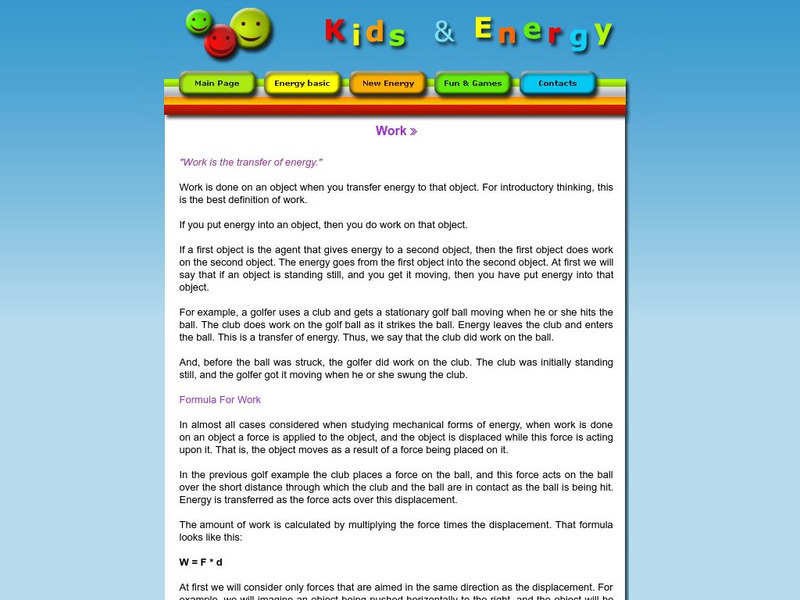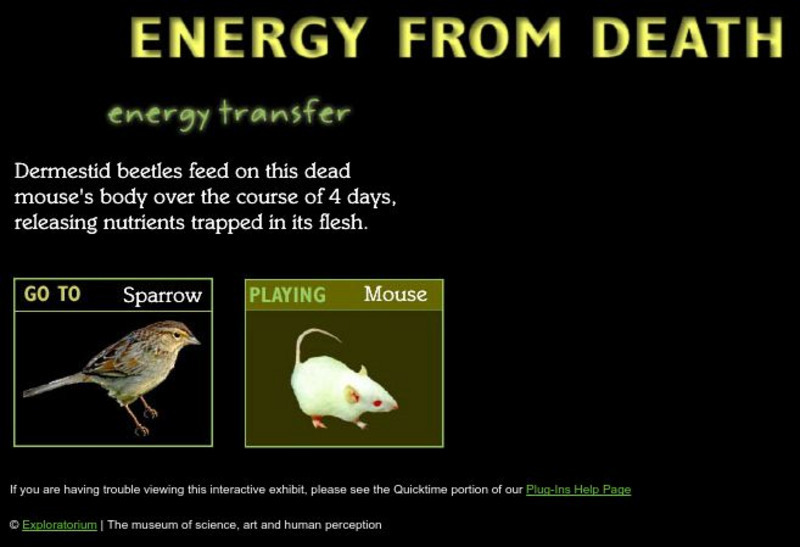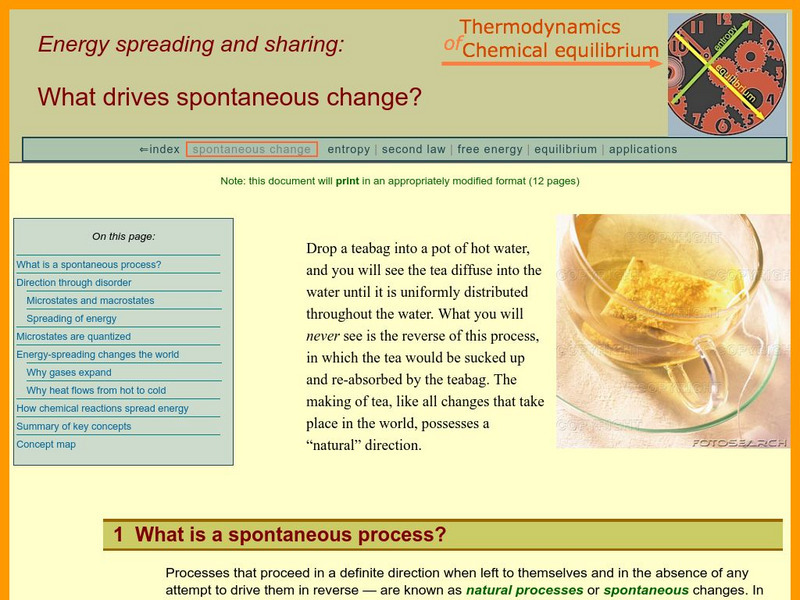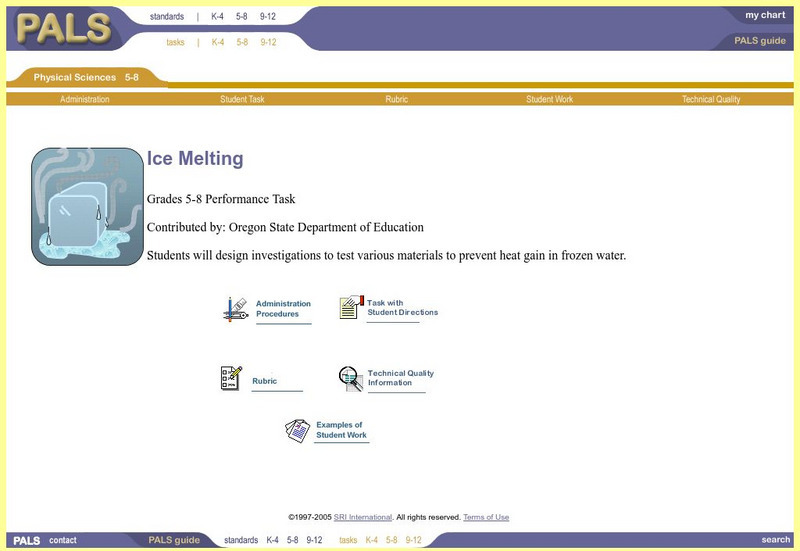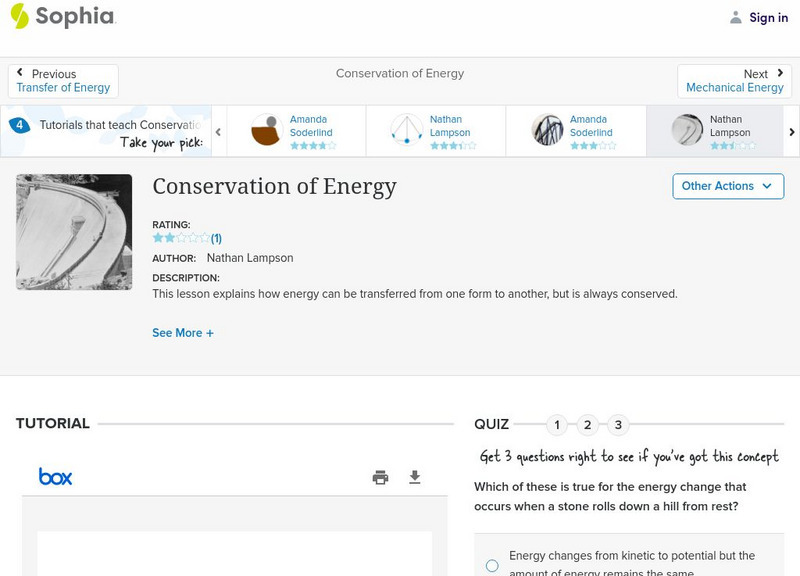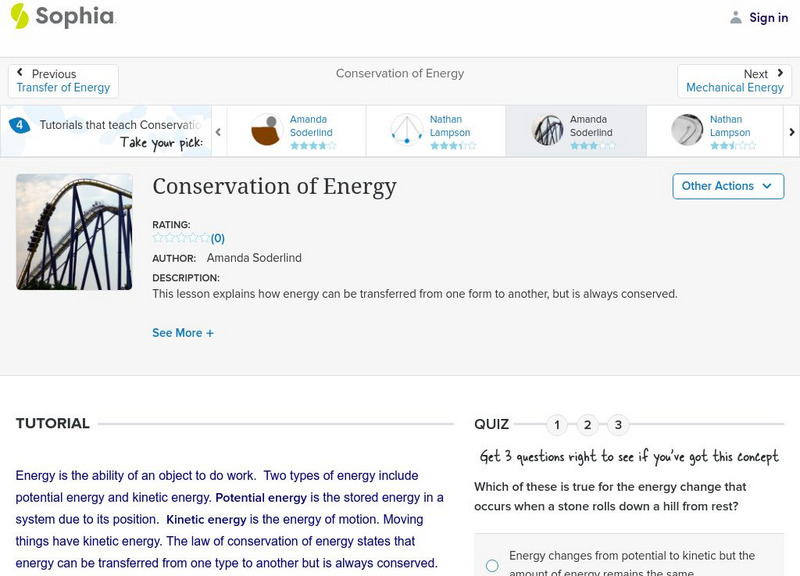Concord Consortium
Concord Consortium: Where Does the Energy of a Spark Come From?
Activity 4 of this module investigates Why do I get shocked if I am too close to the Van de Graaff generator? This activity explores what happens to the potential energy of a system when objects are allowed to move freely (not held in...
Concord Consortium
Concord Consortium: What Makes Water Special?
Activity 2 investigates Why is water different from other liquids? This activity will investigate properties of different liquids. Students will explore what makes honey gooey and thicker than water. And why some liquids evaporate faster...
Concord Consortium
Concord Consortium: What Makes Water Special?
Activity 2 investigates Why is water different from other liquids? This activity will discover the properties of different liquids. Students will explore what makes honey gooey and thicker than water. And why some liquids evaporate...
Concord Consortium
Concord Consortium: What Makes Water Special?
In Activity 1 investigates How are water and other liquids similar and different? The student will see if ideas involving energy, electrostatic interactions, and atomic structure, can be used to explain why a hurricane is so powerful.
Concord Consortium
Concord Consortium: What Happens to the Energy of Water Molecules During Hurricanes?
Activity 2 investigates How Hot Can Water Get? In Activity 2 students analyze the relationship between energy changes and phrase changes as they discuss what happens when water boils. Bonus reading includes Why is Temperature Constant...
Concord Consortium
Concord Consortium: What Happens to the Energy of Water Molecules During Hurricanes?
Activity 1 investigates What does boiling do to water molecules? In this activity students will collect evidence to analyze what happens to water during boiling.
Concord Consortium
Concord Consortium: What Happens to the Energy of Water Molecules During Hurricanes?
In this investigation students will add energy to the model of how molecules interact by completing the following activities. Activity 1 What does boiling do to water molecules? Activity 2 How hot can water go? Activity 3 How does energy...
Concord Consortium
Concord Consortium: What Makes Water Special?
Activity 4 investigates How does electron distribution impact our observations? Students have described how properties of molecules change depending on what atoms make up the molecule. In this activity students will use those ideas to...
Concord Consortium
Concord Consortium: Where Does All the Energy in an Explosion Come From?
In this module Activity 4 investigates How does a spark trigger an explosion?
Concord Consortium
Concord Consortium: What Makes Water Special?
Students will develop explanations connecting observations of water with properties that water exhibits through the following activities. Activity 1 How are water and other liquids similar? Activity 2 Why is water different from other...
Energy for Sustainable Development
Esd Bulgaria: Kids & Energy: Work
Defines what work is, presents the formula for calculating the amount of work, explains what conservation of energy means to a scientist, and discusses energy efficiency.
Exploratorium
Exploratorium: Energy From Death
In this animation you will see how dermestid beetles feed on a dead mouse's body for four days, releasing the nutrients trapped in its flesh. Links to a sparrow animation as well.
Simon Fraser University
Chem1 Virtual Textbook: Energy Spreading
With an overview of topics related to chemical energetics, this site provides a foundation to a study of thermodynamics and information on energy spreading. Topics covered include quantum states, microstates, and energy spreading,...
SRI International
Performance Assessment Links in Science: Ice Melting
A lesson plan for guiding students through a simple research experiment focused on transfer of energy is described for teacher administration and student explanation. Also includes a detailed rubric for evaluating student work.
Other
Ed informatics.com: What Is Work, Energy and Power?
Defines work, energy, and power. Explains the work-energy principle, types and forms of energy, and presents some exercises to try.
Concord Consortium
The Concord Consortium: Molecular Workbench: Overshot Water Wheel
View a simulation of water moving over the top of a water wheel and causing it to move demonstrating the conversion of energy.
Concord Consortium
The Concord Consortium: Molecular Workbench: Undershot Water Wheel
View a simulation of water flowing under a wheel that causes the wheel to rotate. Energy from the water is transferred to the wheel.
PBS
Pbs Teachers: Games Machines Play: Rube Goldberg Challenge
Explore the cartoons of Rube Goldberg and design a complex machine to perform a simple task. Use scientific design elements and information about energy transfer to build a model of the machine.
Sophia Learning
Sophia: Conservation of Energy: Lesson 2
This lesson explains how energy can be transferred from one form to another, but is always conserved. It is 2 of 4 in the series titled "Conservation of Energy."
Sophia Learning
Sophia: Conservation of Energy: Lesson 4
This lesson explains how energy can be transferred from one form to another, but is always conserved. It is 4 of 4 in the series titled "Conservation of Energy."
Sophia Learning
Sophia: Conservation of Energy: Lesson 1
This lesson explains how energy can be transferred from one form to another, but is always conserved. It is 1 of 4 in the series titled "Conservation of Energy."
Other
Dupont: Make Your Own Water Turbine
Students will create their own water turbine to demonstrate the use of water as a renewable energy source. Included is a detailed lesson plan, a video of the activity, and assessment questions.



